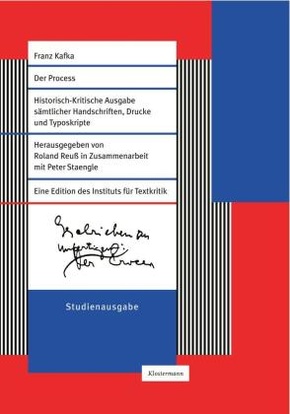
Der Process - Franz Kafka-Ausgabe (FKA). Historisch-Kritische Edition sämtlicher Handschriften, Drucke und Typoskripte
| Verlag | Klostermann |
| Auflage | 2024 |
| Seiten | 888 |
| Gewicht | 2144 g |
| ISBN-10 | 3465046633 |
| ISBN-13 | 9783465046639 |
| Bestell-Nr | 46504663A |
Die Studienausgabe von Kafkas "Process"-Entwurf basiert auf der 1997 im Stroemfeld Verlag publizierten historisch-kritischen Edition, die 16 Konvolute und ein Beiheft in einem Schuber versammelte und inzwischen vergriffen ist. Mit der Studienausgabe erscheinen die Konvolute der einzelnen, unnumerierten Hefte nun in Buchform. Vermittelt wird die offene Struktur des Entwurfs, die zu dem Zeitpunkt vorlag, als Kafka von der Arbeit am Roman abließ, was die Notwendigkeit unterstreicht, sich für genaue Lektüre und Interpretation auf die Spezifik des Manuskriptzusammenhangs einzulassen. Markiert ist zugleich die Kritik an allen von der überschwenglichen Überzeugung geleiteten Textkonstruktionen, es hinsichtlich der Kapitelfolge besser zu wissen als Kafka selbst es wußte. Gedruckt werden die Konvolute am Leitfaden der neutralen alphabetischen Reihenfolge ihrer Titel und der Incipits. Für die Neuausgabe wurde die Transkription geprüft, am Rande jeder Transkriptionsseite ist zur leichteren O rientierung der Kapiteltitel bzw. das Incipit eingefügt. "Mittlerweile kann kein vernünftiger Mensch, der sich etwas mit der Materie befasst, mehr bestreiten, dass das Editionsverfahren der beiden Herausgeber Roland Reuß und Peter Staengle das beste ist. Man kommt Kafka hier, da gibt es keinen Zweifel, näher als bisher." Peter Michalzik, Süddeutsche ZeitungThe study edition of Kafka's "Process" draft is based on the historical-critical edition published by Stroemfeld Verlag in 1997, which brought together 16 volumes and a supplement in a slipcase and is now out of print. With the study edition, the volumes of the individual, unnumbered booklets now appear in book form. The open structure of the draft which represents the status of the text at the time when Kafka abandoned work on the novel, is conveyed, which underlines the necessity of engaging with the specifics of the manuscript context for a precise reading and interpretation. At the same time, it repudiates all text construct ions guided by the editor`s exuberant conviction that he knew better than Kafka himself with regard to the sequence of chapters. The volumes are printed according to the neutral alphabetical order of their titles and incipits. The transcription was checked for the new edition; the chapter title or incipit is inserted in the margin of each transcription page for easier orientation. "No reasonable person who has studied the subject matter can deny that the editing process of the two editors Roland Reuß and Peter Staengle is the best. There's no doubt that you get closer to Kafka here than ever before." Peter Michalzik, Süddeutsche Zeitung
